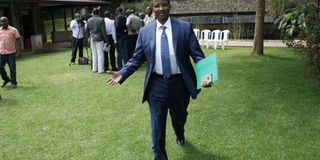Leave all counting and maths to those suited to the task

The Independent Electoral and Boundaries Commission (IEBC) Chairman Issack Hassan during a political parties forum at the Great Rift Valley Lodge in Nakuru County on January 12, 2016. Technology should be banished from Kenyan elections to avoid confusing hard working people trying to get their mathematics right. PHOTO | SULEIMAN MBATIAH | NATION MEDIA GROUP
What you need to know:
- The Independent Review of Elections Commission, headed by Judge Johann Kriegler, discovered that results for the problematic 2007 polls were not accurate.
- Even though there are laws and regulations requiring people to report results at the polling station, the numbers might never reconcile when added.
- The unnecessary early publication of results before people have been prepared psychologically for victory or loss can have significant implications on peace and social harmony.
Arithmetic is just not our thing as Kenyans, especially when it involves votes or money.
Counting is such hard work already without the complication of the outcome determining who rules the country.
As Joseph Stalin observed, those who cast the votes decide nothing. It is those who count the votes who decide everything.
For all of Kenya’s intellectual renown, numbers continue to boggle the country’s best minds.
Kenya’s issues with brackets-of-division-multiplication-addition-subtraction surfaced forcefully when the Independent Review of Elections Commission, headed by Judge Johann Kriegler, discovered that results for the problematic 2007 polls were not accurate.
In its 2008 report, IREC observed: “Almost all parliamentary and presidential election results for the constituencies sampled are erroneous, which means that very few of the officially published figures are actually accurate. In one constituency, Kirinyaga Central, IREC … discovered that the parliamentary candidate with most votes had not been declared the winner, as that honour was enjoyed by the candidate with the second highest number of votes.”
Many elections at the parliamentary level were subsequently nullified in court and by-elections ordered.
Five years down the line, neither computers nor mobile telephones could palliate the inability by court officials to count and add numbers.
Again, when some of the results for the 2013 parliamentary races went to court, the numbers miraculously changed.
There was not a single number posted by the Independent Electoral and Boundaries Commission that was confirmed by a court-ordered recount.
VOTE TALLYING
In Kibwezi West, the candidate who had been declared the runner-up actually had 118 votes more than the winner.
In the Lamu County senatorial race, the judge noted: “Out of the results posted for the nine candidates, none of the numbers presented by the IEBC matched those found by the (Deputy Registrar) after a recount.”
Similar observations were made in the Nyaribari Chache election petition, as in many others.
Such is the nature of Kenyan numbers that you introduce an electronic system, and it immediately starts counting every spoilt vote as three.
Even though there are laws and regulations requiring people to report results at the polling station, the numbers might never reconcile when added.
Sometimes, the technology delivers negative numbers, and other times, exceeds the number of registered voters.
Every technology bought so far sees the numbers and immediately packs up, forcing the country back to manual means.
Technology should be banished from Kenyan elections to avoid confusing hard working people trying to get their mathematics right.
The scale of these errors at the local level only emphasises the need for a national tallying centre that can correct addition and subtraction errors introduced by technology idiots.
More importantly, tallying nationally takes pressure off the polling station.
IEBC'S ROLE
Supposing a station with a large number of voters delayed relaying results in a knife-edge election: angry people would easily descend on it with all manner of crude weapons to compromise the result.
Since you cannot tell which station is likely to delay results, it is impossible to deploy sufficient numbers of armed security officers to prevent a breakdown of law and order.
This is precisely why the IEBC exists — to absorb pressure and take blame.
It receives results and smoothens over the inflammatory parts before they are relayed to the media for public release.
The unnecessary early publication of results before people have been prepared psychologically for victory or loss can have significant implications on peace and social harmony.
Banish the thought that counties should count and declare their own results for all election races. It would be a recipe for chaos.





